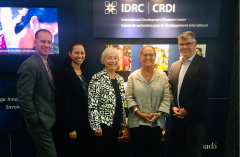On Thursday, 5 September 2019, partners from the International Development Research Centre (IDRC) and the Local Engagement Refugee Research Network (LERRN) held a series of meetings in Ottawa to begin a new initiative to support sustainable research capacity on refugee and forced migration issues in key regions of the global South.

Loren Landau, Richa Shivakoti, Susan McGrath, Roula El-Rifai, and James Milner, at IDRC Offices, 5 September 2019
The goal of the initiative is to work with partners in major refugee-hosting regions of the global South, which hosts 80% of the world’s refugees, to develop a plan to support sustainable, localized research capacity to better influence discussions on refugee issues in local, national, regional and global contexts.
Phase one of the project (September 2019 to January 2020) will map regions in the global South most affected by recurring and protracted instances of large-scale forced migration and the research ecosystems in these regions. Supported by a global advisory network of actors active in different regions of the global South, this phase will include research on models for sustainable research ecosystems and the challenges faced by researchers in the global South.
Phase two of the project (January 2020 to July 2020) will include field visits to priority regions identified in the mapping phase. These field visits will examine models for sustainability and impact in specific local and regional contexts.

Discussion with partners, Carleton University, 5 September 2019
The project responds to four recent trends:
- The broad realization of the importance of localized research in developing new responses to enduring challenges relating to refugees and forced migration in the global South;
- The emerging recognition of the complex links between fragility and forced migration, the nexus between humanitarian responses, development and peace, and the need for holistic and people-centered approaches that respond to the complex nuances of local contexts;
- The critical importance of an inter-disciplinary and multi-sectoral approach to thinking about solutions, including analysis of the local political and economic environment in which refugee self-reliance, solutions, and programming with host communities will be pursued;
- The recognized value of a design that connects all stages of the research process to policy and practice in an organic way by fostering and sustaining dialogue between the research, policy and practitioner communities, in local, regional and global contexts.
“Localization” has become a central theme in development and humanitarian policy and practice, especially since the World Humanitarian Summit in 2016. The need to engage host communities, refugee communities, and national actors across the humanitarian and development fields is equally central to the Global Compact on Refugees (GCR), which was affirmed by the UN General Assembly in December 2018. The GCR is premised on the understanding that responses to refugees are best pursued in partnership with host communities and in response to local conditions, opportunities and interests.
Localized knowledge and sustained research capacity in regions of refugee origin is a vitally important foundation for such localized responses to displacement, yet it is critically under-supported and often lacking in capacity in key refugee-hosting regions. While 80% of the world’s refugees remain in their regions of origin in the global South, well over 80% of research on refugees and forced migration that influences global policy discussions originates from scholars and research centers in the global North. The concentration of research capacity in the global North perpetuates this trend, while support for research centres in refugee-hosting regions in the global South has largely been crisis-driven and unsustainable.
More localized research on refugee and forced migration issues can contribute to more effective policy and practice, especially given the complex dynamics of displacement in fragile contexts and the need to integrate refugee responses into local, national and regional development and peacebuilding strategies.
This question was the focus of an event hosted by IDRC on 26 September 2018, in collaboration with the Local Engagement Refugee Research Network (LERRN). Featuring presentations from Dulo Nyaoro (Kenya), Maha Shuayb (Lebanon) and Jeff Crisp (UK), the event highlighted the challenges faced by researchers based in regions of origin and the many benefits that arise from supporting their leadership in discussions on issues relating to policy and practice.
/https://www.thestar.com/content/dam/thestar/news/gta/2018/10/26/canadians-at-forefront-of-global-study-seeking-solutions-to-refugee-crisis/james_milne_and_maha_shuayb_and_dulo_nyaoro_2_.jpg)
Maha Shuayb, James Milner and Dulo Nyaoro, IDRC event, 26 September 2018
The event highlighted how researchers in key refugee-hosting regions in the global South currently rely on sporadic, project-driven funding and typically play a subservient role to scholars from the global North in the production of knowledge on refugee issues.
In contrast, the event illustrated how vibrant and sustained local knowledge brokers and networks are critical if the goal of localization of refugee policy and practice is to be realized.
The outcomes of the event reinforced the growing concern in the field of refugee and forced migration studies that the lack of sustainable support to research capacity in regions of refugee origins poses ethical and practical challenges to the development of more effective and legitimate responses to protection and solutions for refugees.
In 2012, for example, Loren Landau from the University of the Witwatersrand, argued that the lack of autonomous and reliable support for research capacity in the global South entrenches asymmetrical power relations and inequalities that marginalizes knowledge and perspectives from the global South. In the absence of equitable and sustainable support for research capacity, Landau argued that South-North research networks become “tyrannies of partnership.”
A core objective of LERRN and its collaboration with IDRC is to learn from these lessons and help support sustainable research capacity in regions of refugee origin that can, in turn, generate and promote new approaches to protection and solutions with and for refugees.
For more information on this initiative, please contact: LERRN@carleton.ca